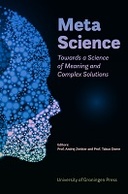Explore

Meta-Science
0 Ungluers have
Faved this Work
Login to Fave
Science has lost its ethical imperatives as it moved away from a science of ought to a science of is. Subsequently, it might have answers for how we can address global challenges, such as climate change and poverty, but not why we should. This supposedly neutral stance leaves it to politics and religions (in the sense of non-scientific fields of social engagement) to fill in the values. The problem is that through this concession, science implicitly acknowledges that it is not of universal relevance.
Objective knowledge, as Karl Popper calls for, might be less easily attainable in the world of ideas and within the confines of scientific idealism. However, if ideas, values and meaning have equal claim to be drivers of change in the sense of causation, aspiring to identify objective knowledge about the world of ideas and of meaning is necessary. If the sciences and disciplines aim to give objectively valid reasons for our actions (and for how to address global challenges), we need to elevate the study of meaning beyond the cultural, disciplinary and ideational delineations. We need to come to a meta understanding of values and meaning equal to objective knowledge about the material world. But differently than in the material world this meta understanding needs to incorporate individual and subjective experiences as cornerstones of objectivity on a meta-level.
We need a science of meaning; one that can scientifically answer Kant’s third question of “what may we hope for”.
This book is included in DOAB.
Why read this book? Have your say.
You must be logged in to comment.
Rights Information
Are you the author or publisher of this work? If so, you can claim it as yours by registering as an Unglue.it rights holder.Downloads
This work has been downloaded 48 times via unglue.it ebook links.
- 48 - pdf (CC BY-NC-ND) at Unglue.it.
Keywords
- Complex solutions
- global challenges
- human flourishing
- Mathematics & science
- Metascience
- philosophy of science
- Science: general issues
- Sustainable development
Links
DOI: 10.21827/648c59a2087f2Editions

